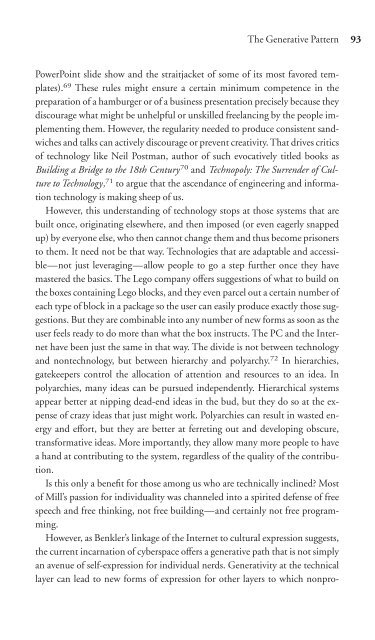Download - Future of the Internet â And how to stop it.
Download - Future of the Internet â And how to stop it.
Download - Future of the Internet â And how to stop it.
You also want an ePaper? Increase the reach of your titles
YUMPU automatically turns print PDFs into web optimized ePapers that Google loves.
The Generative Pattern 93<br />
PowerPoint slide s<strong>how</strong> and <strong>the</strong> stra<strong>it</strong>jacket <strong>of</strong> some <strong>of</strong> <strong>it</strong>s most favored templates).<br />
69 These rules might ensure a certain minimum competence in <strong>the</strong><br />
preparation <strong>of</strong> a hamburger or <strong>of</strong> a business presentation precisely because <strong>the</strong>y<br />
discourage what might be unhelpful or unskilled freelancing by <strong>the</strong> people implementing<br />
<strong>the</strong>m. However, <strong>the</strong> regular<strong>it</strong>y needed <strong>to</strong> produce consistent sandwiches<br />
and talks can actively discourage or prevent creativ<strong>it</strong>y. That drives cr<strong>it</strong>ics<br />
<strong>of</strong> technology like Neil Postman, author <strong>of</strong> such evocatively t<strong>it</strong>led books as<br />
Building a Bridge <strong>to</strong> <strong>the</strong> 18th Century 70 and Technopoly: The Surrender <strong>of</strong> Culture<br />
<strong>to</strong> Technology, 71 <strong>to</strong> argue that <strong>the</strong> ascendance <strong>of</strong> engineering and information<br />
technology is making sheep <strong>of</strong> us.<br />
However, this understanding <strong>of</strong> technology s<strong>to</strong>ps at those systems that are<br />
built once, originating elsewhere, and <strong>the</strong>n imposed (or even eagerly snapped<br />
up) by everyone else, who <strong>the</strong>n cannot change <strong>the</strong>m and thus become prisoners<br />
<strong>to</strong> <strong>the</strong>m. It need not be that way. Technologies that are adaptable and accessible—not<br />
just leveraging—allow people <strong>to</strong> go a step fur<strong>the</strong>r once <strong>the</strong>y have<br />
mastered <strong>the</strong> basics. The Lego company <strong>of</strong>fers suggestions <strong>of</strong> what <strong>to</strong> build on<br />
<strong>the</strong> boxes containing Lego blocks, and <strong>the</strong>y even parcel out a certain number <strong>of</strong><br />
each type <strong>of</strong> block in a package so <strong>the</strong> user can easily produce exactly those suggestions.<br />
But <strong>the</strong>y are combinable in<strong>to</strong> any number <strong>of</strong> new forms as soon as <strong>the</strong><br />
user feels ready <strong>to</strong> do more than what <strong>the</strong> box instructs. The PC and <strong>the</strong> <strong>Internet</strong><br />
have been just <strong>the</strong> same in that way. The divide is not between technology<br />
and nontechnology, but between hierarchy and polyarchy. 72 In hierarchies,<br />
gatekeepers control <strong>the</strong> allocation <strong>of</strong> attention and resources <strong>to</strong> an idea. In<br />
polyarchies, many ideas can be pursued independently. Hierarchical systems<br />
appear better at nipping dead-end ideas in <strong>the</strong> bud, but <strong>the</strong>y do so at <strong>the</strong> expense<br />
<strong>of</strong> crazy ideas that just might work. Polyarchies can result in wasted energy<br />
and effort, but <strong>the</strong>y are better at ferreting out and developing obscure,<br />
transformative ideas. More importantly, <strong>the</strong>y allow many more people <strong>to</strong> have<br />
a hand at contributing <strong>to</strong> <strong>the</strong> system, regardless <strong>of</strong> <strong>the</strong> qual<strong>it</strong>y <strong>of</strong> <strong>the</strong> contribution.<br />
Is this only a benef<strong>it</strong> for those among us who are technically inclined Most<br />
<strong>of</strong> Mill’s passion for individual<strong>it</strong>y was channeled in<strong>to</strong> a spir<strong>it</strong>ed defense <strong>of</strong> free<br />
speech and free thinking, not free building—and certainly not free programming.<br />
However, as Benkler’s linkage <strong>of</strong> <strong>the</strong> <strong>Internet</strong> <strong>to</strong> cultural expression suggests,<br />
<strong>the</strong> current incarnation <strong>of</strong> cyberspace <strong>of</strong>fers a generative path that is not simply<br />
an avenue <strong>of</strong> self-expression for individual nerds. Generativ<strong>it</strong>y at <strong>the</strong> technical<br />
layer can lead <strong>to</strong> new forms <strong>of</strong> expression for o<strong>the</strong>r layers <strong>to</strong> which nonpro-


